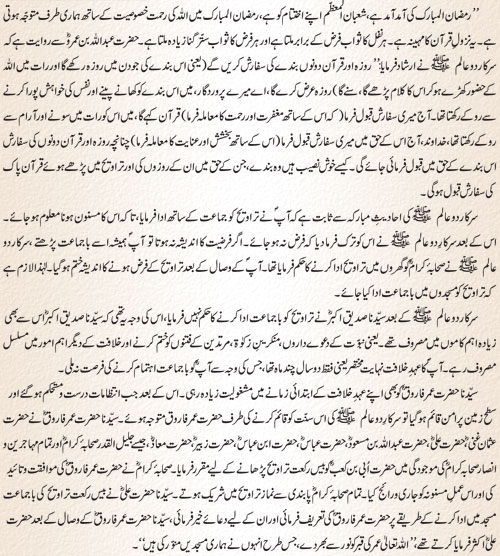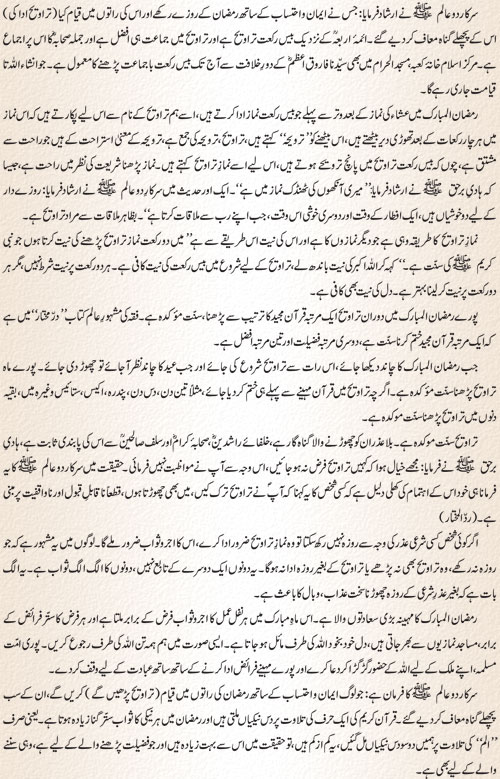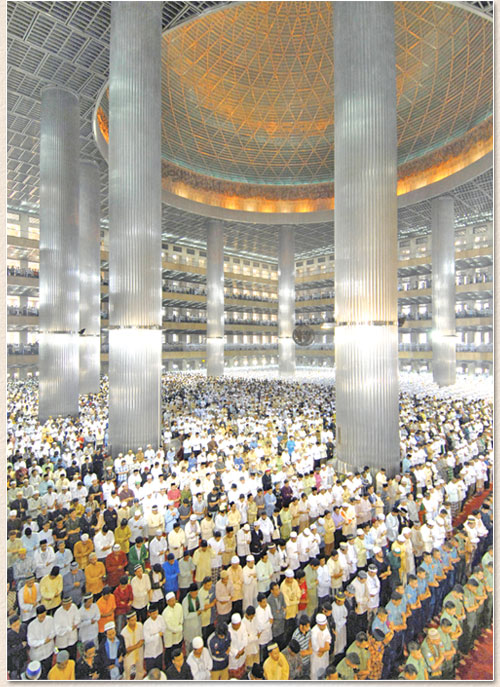Abu Hurayrah (may Allaah be pleased with him) said: “The Messenger of Allaah [an error occurred while processing this directive] (peace and blessings of Allaah be upon him) used to encourage us to pray at night in Ramadaan, without making it obligatory. Then he said, ‘Whoever prays at night in Ramadaan out of faith and the hope of reward, all his previous sins will be forgiven.’ When the Messenger of Allaah [an error occurred while processing this directive] (peace and blessings of Allaah be upon him) died, this is how things were (i.e., Taraaweeh was not prayed in congregation), and this is how they remained during the khilaafah of Abu Bakr (may Allaah be pleased with him), until the beginning of the khilaafah of ‘Umar (may Allaah be pleased with him).”
‘Amr ibn Murrah al-Juhani said: “A man from Qudaa’ah came to the Messenger of Allaah [an error occurred while processing this directive] (peace and blessings of Allaah be upon him) and said, ‘O Messenger of Allaah! What do you think if I testify that there is no god except Allaah, and that you, Muhammad, are His Messenger, and I pray the five daily prayers, and fast in the month (of Ramadaan), and pray at night in Ramadaan, and pay zakaah?’ The Prophet [an error occurred while processing this directive] (peace and blessings of Allaah be upon him) said: ‘Whoever dies on that will be among the siddeeqeen (those who tell the truth) and the martyrs.’”
Laylat al-Qadr and its timing
2 – The best of its nights is Laylat al-Qadr, because the Prophet [an error occurred while processing this directive] (peace and blessings of Allaah be upon him) said: “Whoever prays at night during Laylat al-Qadr {and manages to “catch” it} out of faith and the hope of reward, all his previous sins will be forgiven.”
3 – According to the most correct opinion, it is the twenty-seventh night of Ramadaan. Most of the ahaadeeth state this, such as the hadeeth of Zurr ibn Hubaysh, who said: “I heard Ubayy ibn Ka’b saying – and it was said to him that ‘Abd-Allaah ibn Mas’ood said: ‘Whoever follows the Sunnah will ‘catch’ Laylat al-Qadr!’ – Ubayy (may Allaah be pleased with him) said: ‘May Allaah have mercy on him, he did not want people to take it for granted and only stay up to pray on one night. By the One besides Whom there is no other god, it is in Ramadaan – he was swearing without a doubt – and by Allaah, I do know which night it is. It is the night in which the Messenger of Allaah [an error occurred while processing this directive] (peace and blessings of Allaah be upon him) commanded us to pray (qiyaam). It is the night the morning of which is the twenty seventh, and the sign of it is that the sun rises on that morning white and without rays.’”
In another report, this was attributed to the Prophet [an error occurred while processing this directive] (peace and blessings of Allaah be upon him). (Reported by Muslim and others).
Praying qiyaam in congregation
It is allowed to pray qiyaam in congregation, indeed it is better than praying individually, because this is what the Prophet [an error occurred while processing this directive] (peace and blessings of Allaah be upon him) did himself and explained its virtues. Abu Dharr (may Allaah be pleased with him) said: “We fasted Ramadaan with the Messenger of Allaah [an error occurred while processing this directive] (peace and blessings of Allaah be upon him) and he did not lead us in qiyaam at all until there were only seven days left, when he led us in prayer until a third of the night had passed. When there were six days left, he did not lead us in qiyaam. When there were five days left, he led us in prayer until half the night had passed. I said, ‘O Messenger of Allaah, I wish that you had continued until the end of the night.’ He said, ‘If a man prays with the imaam until he finishes, it will be counted as if he prayed the whole night.’ When there were four nights left, he did not lead us in qiyaam. When there were three nights left, he brought together his family, his wives and the people, and led us in qiyaam until we were afraid that we would miss al-falaah. I asked, ‘What is al-falaah?’ he said, ‘Suhoor. Then he did not lead us in qiyaam for the rest of the month.’” (Saheeh hadeeth reported by the authors of Sunan).
The reason why the Prophet [an error occurred while processing this directive] (peace and blessings of Allaah be upon him) did not continually lead the people in praying qiyaam in congregation
5 - The Prophet [an error occurred while processing this directive] (peace and blessings of Allaah be upon him) did not lead them in qiyaam for the rest of the month because he feared that it would then become obligatory, and they would not be able to do it, as is stated in the hadeeth of ‘Aa’ishah reported in al-Saheehayn and elsewhere. Following the death of the Prophet [an error occurred while processing this directive] (peace and blessings of Allaah be upon him), that fear was no longer a factor, because Allaah had completed the religion. The reason for not praying qiyaam in congregation during Ramadaan no longer applied, and the previous ruling, that congregational prayer is something prescribed in Islam, remained in effect. So ‘Umar (may Allaah be pleased with him) revived the practice, as is recorded in Saheeh al-Bukhaari and elsewhere.
Women can pray qiyaam in congregation
Women can attend the prayers too, as is stated in the hadeeth of Abu Dharr referred to above. Indeed, it is permissible to appoint an imaam just for them, apart from the imaam of the men. It was proven that when ‘Umar (may Allaah be pleased with him) gathered the people to pray qiyaam, he appointed Ubayy ibn Ka’b to lead the men and Sulaymaan ibn Abi Hathmah to lead the women. ‘Arfajah al-Thaqafi said: “ ‘Ali ibn Abi Taalib (may Allaah be pleased with him) used to command the people to pray during the night in Ramadaan, and he would appoint an imaam for the men and an imaam for the women. I was the imaam for the women.”
I say: this is fine in my view so long as the mosque is big enough so that they will not disturb one another.
Number of rak’ahs of qiyaam
7 – The number of rak’ahs is eleven, and it is preferable in our opinion not to exceed this number, following the practice of the Messenger of Allaah [an error occurred while processing this directive] (peace and blessings of Allaah be upon him), because he never did more than that in his life. ‘Aa’ishah (may Allaah be pleased with her) was asked about how he prayed in Ramadaan. She said, “The Messenger of Allaah [an error occurred while processing this directive] (peace and blessings of Allaah be upon him) never prayed more than eleven rak’ahs (of qiyaam), whether during Ramadaan or any other time. He would pray four, and don’t ask me how beautiful or how long they were. Then he would pray four, and don’t ask me how beautiful or how long they were. Then he would pray three.” (Reported by al-Bukhaari, Muslim and others).
8- A person may do less than that, even if it is only one rak’ah of witr, because of the evidence that the Prophet [an error occurred while processing this directive] (peace and blessings of Allaah be upon him) did this and spoke about it.
With regard to him doing it: ‘Aa’ishah (may Allaah be pleased with her) was asked how many rak’ahs the Messenger of Allaah [an error occurred while processing this directive] (peace and blessings of Allaah be upon him) used to pray in witr? She said, “He used to pray four and three, or six and three, or ten and three. He never used to pray less than seven, or more than thirteen.” (Reported by Abu Dawood, Ahmad and others).
With regard to him speaking about it, he said: “Witr is true, so whoever wishes can pray five, and whoever wishes can pray three, and whoev
Posted on 8/21/2008 10:13:46 AM







